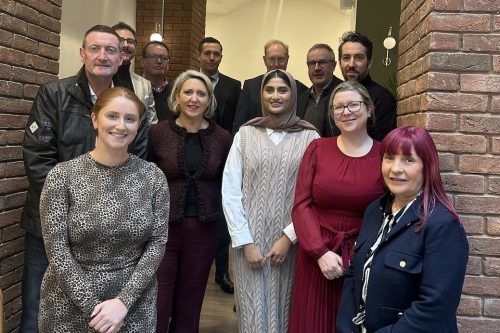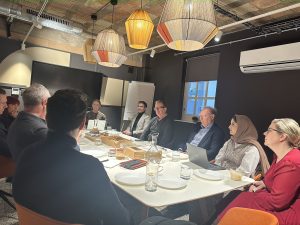Round table report: leading business voices share insights and projections for 2024/25


The conversation focused on strategies to drive economic growth across the West Midlands including regeneration, talent retention, skills development, innovation, investment, and cultural creativity.
Jacqueline Bullock, brand manager at Pertemps offered insights on recruitment and workforce dynamics, expressing concerns about the significant skills deficit in Birmingham, which she anticipates will worsen this year.
She said: “The focus shouldn’t solely be on what credentials are listed on a candidate’s CV. It’s unlikely for someone to meet every skill requirement, but they may possess 70 or 80% of what’s needed. We’re working with clients to look at not just skills, but the candidate’s drive, tenacity and ambitions.
“I believe the skills gap will worsen this year, especially with the upcoming changes in the minimum wage. It’s a two-way street; employers demand specific skills but aren’t always prepared to pay accordingly. Money is tight for everyone, but if you find someone who excels in every aspect, it’s worth the investment. The pressing question is: how do we change this situation to prepare these individuals for employable jobs?”
In the dynamic realm of AI, it has become important for businesses to factor it into their strategies even when it comes to recruitment.
Yiannis Maos, CEO of TechWM, said: “I think over the last 18 months, everyone wants people to know and be able to use AI to their advantage. But what does that mean?
“Educating businesses on what they need, whether that’s AI or data, digital transformation is essential, but there’s absolutely a war on talent in technology. We need to address some fundamentals around the curriculum around adult learning to fix that problem, but also on the demand side as well. It’s making sure that businesses and the economy are in a position where if we do create that talent, we don’t lose it.”
Rob Valentine, regional director at Bruntwood SciTech continued: “Surely, the aim is to create opportunities that align with the potential of our universities and their research endeavours. The goal is to unlock this potential, not only benefiting graduates but also attracting more talent to the region.
“It’s essential, however, to recognise that opportunities should extend beyond graduate skills. Engaging with schools and adults is crucial to equip them with the necessary skills for participation. It’s about broadening life skills rather than solely focusing on a rigid university curriculum tailored for immediate employment.
“I find when I’m recruiting somebody I’m not necessarily looking for the skills, I’m more interested in them as an individual and their attitude”.
James Dickinson, managing director at Wavenswere Homes drew attention to the hurdles in the delay of planning applications, hindering crucial development projects and how we can move forward in building more houses so the West Midlands can grow.
He said: “Planning plays a crucial role in development, yet many local authorities have faced significant budget cuts, particularly in their planning departments, with reductions of up to 40%. Currently, I have four schemes in the planning stages which should have been resolved months ago. These projects, focusing on large-scale regeneration efforts, are stuck in the planning phase despite minimal controversy. These sites, often neglected for decades, have received positive feedback but progress is hindered by bureaucratic delays.”
An investigation has recently been launched by the Competition and Markets Authority over fears that the sharing of commercially sensitive information is weakening competition in the market.
The CMA is looking into Barratt, Bellway, Berkeley, Bloor Homes, Persimmon, Redrow, Taylor Wimpey, and Vistry, to see if information shared between the competitors is influencing the build-out of sites and the prices of new homes.
But for Dickinson, it’s overlooking the need for more SME developers to fill a gap within the market.
“The dominance of major players in large-scale projects leaves minimal opportunities for individual buyers, driving up prices and exacerbating the trend of ‘Generation Rent.’ To address this, there’s a call for innovative housing typologies that enable aspiring homeowners to save for deposits without feeling overwhelmed by unattainable goals. There needs to be a shift towards efficient design and construction methods to offer affordable units without compromising quality.”
The discussion delved into challenges faced by small businesses, which now make up 99.05% of businesses in the UK, including late payments and the impact of insolvencies on subcontractors. Despite these obstacles, there was a sense of optimism regarding the growing opportunities for SMEs, particularly in light of Brexit and foreign direct investment.
Rob Harrison, part of the Small Business Council said: “The challenges faced by small businesses were somewhat overlooked last year. Many small business owners breathed a sigh of relief, only to discover belatedly that the economy had entered a recession in December. Despite this, there’s a glimmer of optimism on the horizon. Order books are gradually filling up, and opportunities that were elusive last year are starting to materialize.
“However, the struggles persist particularly with rising costs and the disproportionate impact of high street rates on small businesses compared to larger chains. Addressing this imbalance could significantly benefit small enterprises.
“Late payments remain a major issue despite government assurances of legislative action. This persistent problem continues to inflict significant damage on small businesses. An alarming trend highlighted by insolvency practitioners is the increasing number of businesses closing their doors not just due to financial strain, but also due to owners simply feeling exhausted and demotivated. Many opt for voluntary liquidation, showing a concerning level of disillusionment among small business owners.”
Rumana Khanom a solicitor at Beven Brittian stressed the fact that the younger generation is now more willing to shop small and influence through social media sites.
She said: “Social media has become a significant catalyst for the younger generation and is crucial in supporting small businesses. We witness more success stories, particularly on social media platforms, where small businesses actively promote their improved performance due to this influence.”
Innovation zones were unveiled by Chancellor Jeremy Hunt and in the West Midlands it will focus on advanced manufacturing across Birmingham, Wolverhampton and Coventry, with expectations that the zone could leverage £2bn in private investment and create 30,000 jobs by 2034.
For Professor Nigel Driffield, a significant challenge lies in helping businesses and individuals transition into new industries, especially in manufacturing.
He said: “There are about 22,000 people in the West Midlands whose jobs are tied to internal combustion engines. As the industry shifts, they need support to adapt, whether it’s transitioning to new technologies like heat pumps or other related fields. Skills development, business support, and investment are crucial to prevent setbacks caused by the displacement of skilled workers. This is where the Innovation Zone can play a vital role, maximizing opportunities across various regions like Birmingham, Coventry, and the Black Country.”
Andrew Lovett, CEO of the Black Country Living Museum has overseen the museum’s multi-million-pound expansion over the last few years.
He believes BCLM is fortunate as, “unlike many museums facing similar challenges such as rising costs and the burden of meeting living wage standards, we are not subsidized by local authorities; we rely solely on trading to sustain ourselves. This is especially fortunate considering our recent substantial multi-million-pound development, which is projected to draw over 400,000 visitors to our museum this year. Reflecting 15 years ago, mentioning “Metro” would have drawn a blank face, but now its significance is unmistakable.
“The metro attained a legendary status, but now it’s becoming a reality, and we played a crucial role in the business case for it coming to the BCLM. However, I believe we’ll need to exert considerable effort to shift people’s travel habits, especially their reliance on cars. For the first time, there will be a viable public transport option to reach the museum. However, we aim to find sustainable uses and change perceptions, which entails significant internal investments and hopefully, shifting mindsets.”
Wrapping up the discussion on budget priorities, every panellist leaned towards the necessity for economic stability and targeted investments.
Eleanor Deeley, managing director of the Deeley Group said: “Short-term goals are clear, but there’s also a focus on setting the stage for long-term economic health. Productivity growth has stalled, leading to increased taxes. To address this, stakeholders urge strategic investments, even if it means sacrificing short-term gains for long-term stability. Business rates and council taxes need a rethink to support growth. There are worries about immigration policies deterring investment and talent. The West Midlands needs a budget that ensures stability and targeted investments for future prosperity.
“The essentials are clear: housing, healthcare facilities, education, and the development of skills and job opportunities for the future. These are not intricate matters; rather, they are fundamental pillars that demand immediate attention and action.”
Valentine believes that implementing a gains tax is one measure that should be introduced.
He said: continued: “Implementing a gains tax when land use changes, like from farming to housing helps capture the increased land value. We also need to revamp planning procedures so builders can create better homes. Investing in infrastructure, like tram networks seen in cities like Manchester, is crucial too”.
He concluded that giving regions more autonomy through devolution is vital.
“Ministers visiting the region should engage with local needs, not just for photo ops. To unlock the region’s full potential, we need more devolution. In short, we should rethink policies, invest in infrastructure, and push for more devolution to unleash the region’s potential.”










